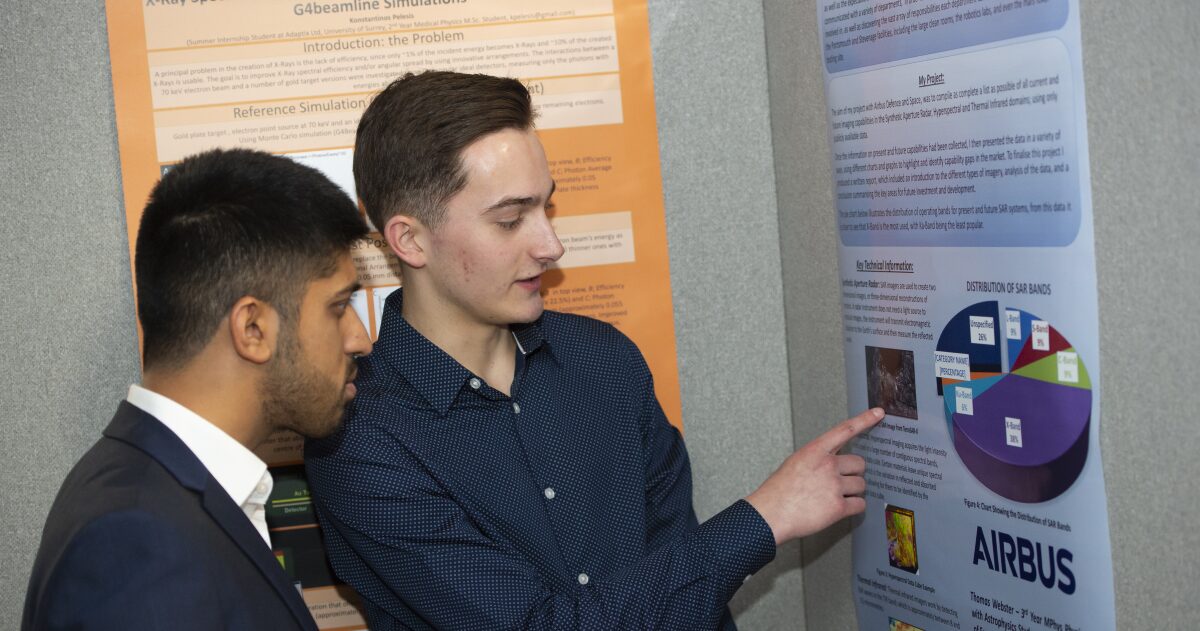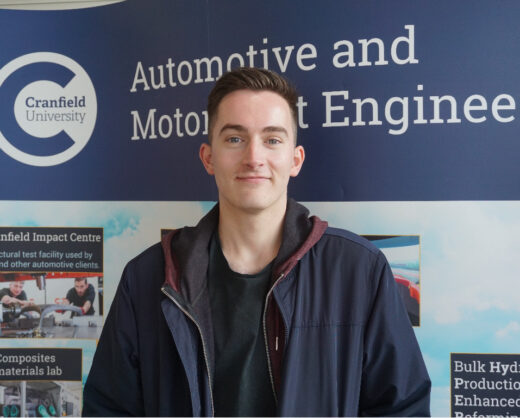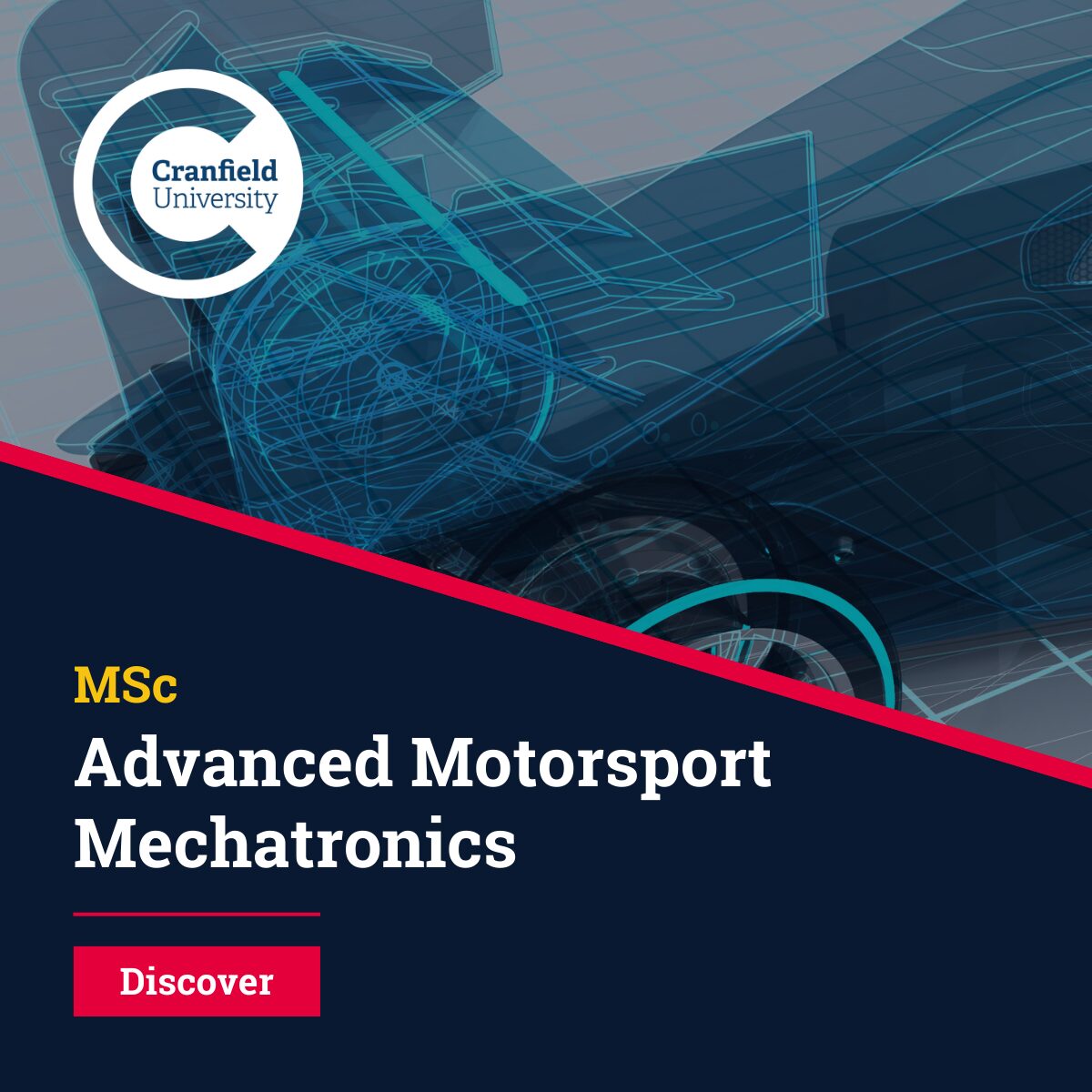Advanced Motorsport Mechatronics MSc student Tom on life at Cranfield and his Formula 1 aspirations
02/02/2024

Tom Webster is an Advanced Motorsport Mechatronics MSc student and recipient of the Motorsport Future Technologies Award. Here, he talks about why he chose his programme, his experience so far, and his career aspirations.
Can you tell us a bit about your life before you came to Cranfield?
I completed an integrated master’s degree (MPhys) in Physics and Astrophysics at the University of Sussex in 2021, having carried out four summer internship positions at companies such as Airbus and the UK Atomic Energy Authority (UKAEA). Upon graduation I returned to UKAEA as a control software engineer working on the world’s leading fusion experiments, which aim to enable to development of fusion as a source of clean and abundant energy, before progressing into a systems engineering role on the UK prototype fusion powerplant “STEP” (Spherical Tokamak for Energy Production). While on the graduate scheme at UKAEA, I developed a passion for scientific outreach and communication, attending local science and technology events in Oxford, as well as large public festivals such as New Scientist Live and the Goodwood Festival of Speed. These events are incredibly rewarding and engaging to attend, especially when sharing the exciting developments in the world of fusion energy.
What inspired your passion for motorsport?
As an engineer, the fast-paced competitive nature of the industry has fascinated me since I first started considering my career options at the beginning of my physics degree. When envisioning the type of career I wish to develop, it is this type of environment that will enable me to push myself and continually explore innovation.
Why did you choose the Advanced Motorsport Mechatronics MSc?
The motorsport programme at Cranfield is the best on offer. Having browsed the modules which are featured in the Advanced Motorsport Mechatronics MSc course, I was excited by the prospect of developing skills in all of the areas covered, and this was a feeling I couldn’t shake! The course puts emphasis on the modelling, simulation and control aspects of testing and developing motorsport systems, which has become an increasingly valuable and important part of building a competitive advantage in race teams.
You are a recipient of the Motorsport Future Technologies Award issued by Coachmakers Livery of London/ Cranfield University. How does it feel to be selected?
I attended the open day in May 2023, with no intention of applying and actually doing the course straight away, merely to get an idea for if it was something I should save up some money for, and maybe complete in the future as a way to improve my chance of being successful in motorsport. Having spoken to James Brighton at the open day for some general careers advice, I was made aware of the Coachmakers award and shortly after I was interviewed and accepted! I wouldn’t have been able to join this course without the support from Cranfield and the Coachmakers with this award, so I feel incredibly lucky and grateful to be given the opportunity to study here.
How are you finding your course? What are the highlights?
The course is fantastic. I’ve learnt so much since starting in October 2023 and the assignments have been challenging and rewarding. The highlights are definitely the practical sessions; we have been lucky enough to get hands-on with instrumentation and sensors, do on-track testing and data analysis, as well as design embedded control systems on hardware. The teaching and support staff are all so passionate about making sure this course is the best it can possibly be, and the student feedback is taken on-board and acted upon, which makes a huge difference to our enjoyment of the course. We have been lucky enough to receive guest lectures from a variety of companies and motorsport teams, making this course extremely special and providing valuable insights into how the industry operates. The voluntary Formula 1 design sprint project, which took place throughout November and December, was another valuable opportunity to explore the challenges within industry. Investigating the impact of the 2026 F1 engine regulations on the methods by which hybrid energy can be deployed and recovered most effectively, as a student-run project, proved to be a learning opportunity like no other.

What is your experience of Cranfield so far?
I had always heard good things about the courses on offer at Cranfield, especially the motorsport programmes, so I had high expectations. The course and the staff have exceeded all of these, and with Cranfield’s strong links to industry I feel like I am a part of the industry itself, not just a student. The careers support service, networking opportunities and facilities have all been amazing and I feel lucky to have the opportunity to study here!
What are your plans after graduating?
My career ambitions are ultimately to be continually challenged, and always be learning new skills. I have a broad range of interests from vehicle dynamics modelling and simulation, to control systems and powertrains, so a career within these specialisms would be extremely satisfying. My ultimate career goal, however, is to become a race strategist in Formula 1. The challenge of making split-second decisions that could make a significant difference in the race outcome is fascinating to me.
What advice would you give to others aspiring to work in the motorsport industry?
The advice I try to follow is to just enjoy the process as much as possible, and learn as much as I can on the way to (hopefully) working in a motorsport environment.
Who is your professional inspiration?
I admire the success of James Vowles and Hannah Schmitz, particularly with their ability to maintain the highest level of performance for many years. Earning a position in a Formula 1 team is a huge achievement, but being able to thrive in that environment and rise to the top of their respective disciplines, maintaining that level of technical and professional excellence, is something I strive to achieve.
What else should we know about you?
I failed two exams in the first year of my physics degree, and it turned out to be the best thing to happen to my career!
Categories & Tags:
Leave a comment on this post:
You might also like…
From classroom to cockpit: What’s next after Cranfield
The Air Transport Management MSc isn’t just about learning theory — it’s about preparing for a career in the aviation industry. Adit shares his dream job, insights from classmates, and advice for prospective students. ...
Setting up a shared group folder in a reference manager
Many of our students are now busy working on their group projects. One easy way to share references amongst a group is to set up group folders in a reference manager like Mendeley or Zotero. ...
Company codes – CUSIP, SEDOL, ISIN…. What do they mean and how can you use them in our Library resources?
As you use our many finance resources, you will probably notice unique company identifiers which may be codes or symbols. It is worth spending some time getting to know what these are and which resources ...
Supporting careers in defence through specialist education
As a materials engineer by background, I have always been drawn to fields where technical expertise directly shapes real‑world outcomes. Few sectors exemplify this better than defence. Engineering careers in defence sit at the ...
What being a woman in STEM means to me
STEM is both a way of thinking and a practical toolkit. It sharpens reasoning and equips us to turn ideas into solutions with measurable impact. For me, STEM has never been only about acquiring ...
A woman’s experience in environmental science within defence
When I stepped into the gates of the Defence Academy it was the 30th September 2019. I did not know at the time that this would be the beginning of a long journey as ...







